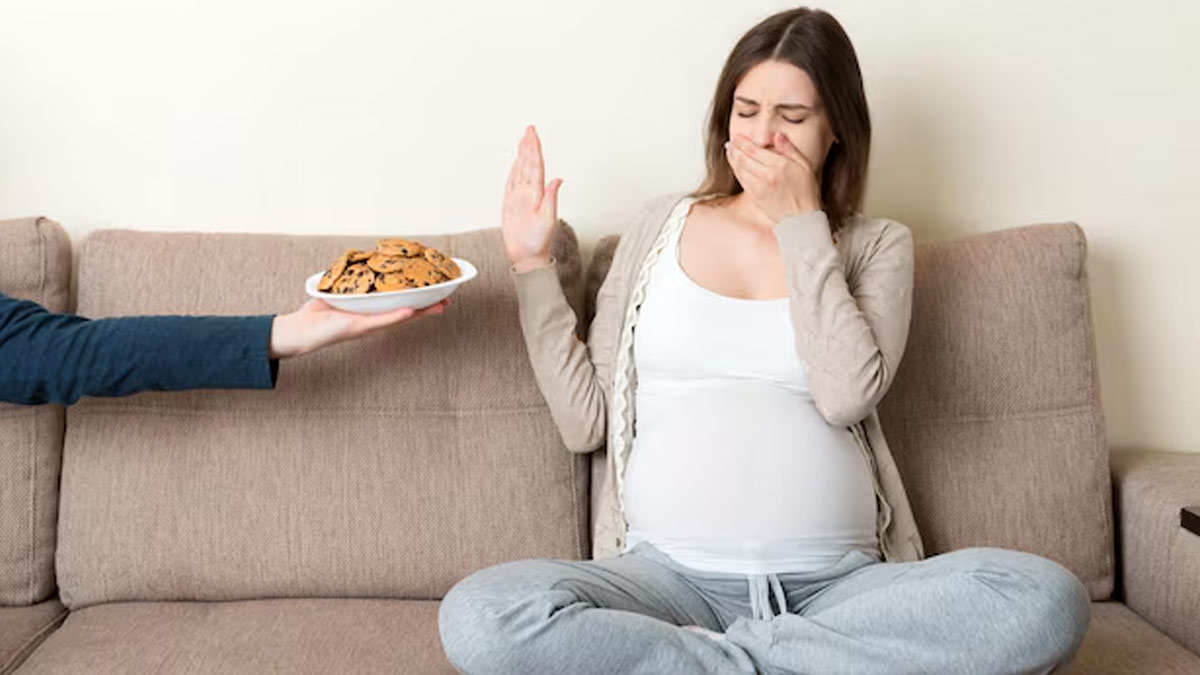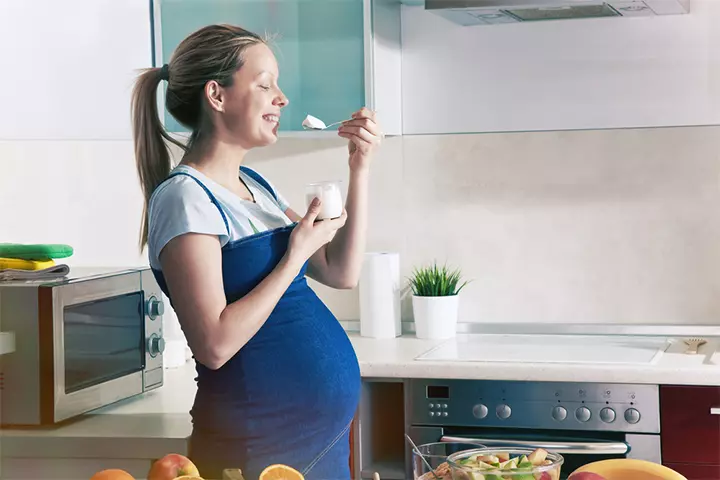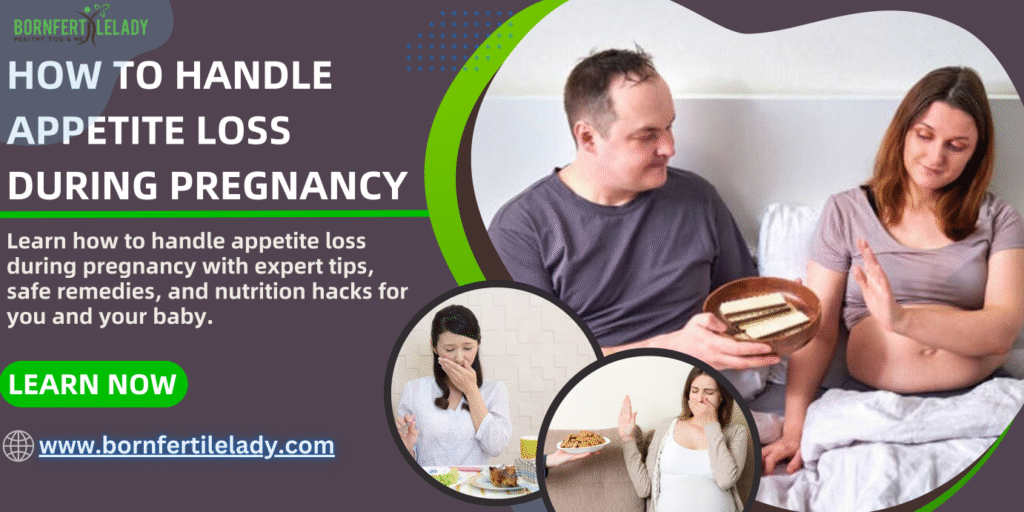Feeling less hungry while pregnant can feel scary, but you are not alone, as many pregnant women ask how to handle appetite loss during pregnancy. This is a common concern, especially in the early months, because as your hormones change, smells bother you more, and nausea can make eating hard.
But your body needs food, and so does your baby. That is why eating even small amounts matters, and the good news is, there are easy ways to help. You can try small meals, simple foods, and safe natural remedies.
This article will give you trusted, doctor-approved tips, and it will also share hacks to get back your appetite. We will keep it simple and helpful, and so, if you are worried about not eating enough, keep reading. Let’s take care of you and your baby, step by step.
Appetite Loss During Pregnancy

Many people imagine pregnant women constantly craving food and eating everything around them. While that does happen for some, many other pregnant women struggle to eat at all. This can become serious because not eating enough may lead to poor weight gain, which is important for a healthy pregnancy.
In the early stages of pregnancy, many symptoms like heartburn, nausea, constipation, and morning sickness tend to come all at once. Sometimes, just the smell of certain foods is enough to make you lose your appetite completely. This happens at the same time your doctor and family are encouraging you to eat well, but it may feel nearly impossible.
Also, during the first few months, changes in hormones can make you feel sad, irritated, or nervous. When you add that to feeling sick almost every morning, eating might be the last thing on your mind.
What Leads to Loss of Appetite During Pregnancy?

It’s quite common for your hunger levels to change, especially since your body goes through many changes while you’re pregnant.
When you lose your appetite, you might not feel like eating anything at all, or you may simply lose interest in food in general. Keep in mind that this is different from disliking a few specific foods, which also happens often during pregnancy.
Below are reasons why a pregnant woman may lose her appetite, including the following:
1. Nausea and Vomiting
Feeling sick and throwing up are some main reasons many pregnant women lose their appetite. These symptoms usually show up early in pregnancy, especially in the first few months, but they can stick around longer for some women.
Even mild or strong feelings of nausea can make it very hard to eat well. Hormonal changes during pregnancy, especially involving leptin and hCG (human chorionic gonadotropin), may cause a drop in appetite and make nausea and vomiting worse.
In one study that looked at 2,270 pregnant women, researchers found that 42% of those with moderate nausea and 70% of those with severe nausea had a drop in how much food they ate early in pregnancy.
If you’re not feeling hungry because of nausea and vomiting, try staying away from spicy or greasy foods, drinking liquids separately from meals, and eating smaller meals more often. Dry snacks like crackers or pretzels and bland meals like plain baked chicken may be easier to eat.
But if your symptoms are very strong or won’t go away, it’s best to see a healthcare provider for help.
2. Mental Health Issues
Mental health conditions like anxiety or depression can also lower your desire to eat. Pregnant women might be more likely to face emotional challenges due to all the changes happening in their bodies.
Depression, in particular, can affect how and what you eat, sometimes causing you to eat much less and skip nutrient-rich foods. In a study with 94 pregnant women, 51% of those with depression were eating poorly, and this number rose to 71% after six months.
Depression during pregnancy can make you crave unhealthy foods while losing interest in healthy ones. This leads to eating less of key nutrients like folate, iron, zinc, and healthy fats, all of which are very important for both mom and baby.
Because of shame or fear, many pregnant women don’t talk about these mental struggles, but it’s important to speak with a trusted doctor or counselor if you’re having emotional difficulties.
3. Medications
Some medicines taken during pregnancy can lead to a lower appetite. For example, antidepressants like Zoloft and Prozac, known as SSRIs (selective serotonin reuptake inhibitors), are sometimes prescribed to pregnant women with mental health conditions.
However, these drugs can make you lose your appetite, feel full too quickly, or even lead to weight loss. Other medications, such as olanzapine and buprenorphine, may also reduce appetite.
4. Eating Disorders
Some pregnant women may struggle with eating disorders like anorexia or bulimia. Studies estimate that between 0.6% and 27.8% of pregnant women may deal with disordered eating. These disorders can cause fear of gaining weight, changes in appetite, and not eating enough.
If you’re pregnant and have a history of an eating disorder, it’s important to get support and guidance from a healthcare provider.
5. Hormonal Shifts
Pregnancy causes many hormonal changes that can mess with your body’s hunger signals. These shifts might make you feel less hungry than normal.
6. Morning Sickness
Many pregnant women have morning sickness, which makes them feel nauseous and less interested in food. This doesn’t just happen in the morning, as it can hit at any time during the day.
7. Changes in Taste and Smell
When you’re pregnant, your sense of smell becomes more sensitive, and smells that used to be fine might suddenly make you feel sick, as even your favorite meals might taste strange or unappetizing.
8. Physical Discomfort
As your baby grows, your stomach has less space, which can make you feel full more quickly. Other issues, like heartburn or constipation during pregnancy, can also lower your appetite.
9. Stress and Emotions
Pregnancy can be stressful. Worrying about your baby, your health, or other things going on in life can make you feel anxious, and stress can take away your desire to eat.
10. Body’s Nutrient Storage
Sometimes your body already has enough nutrients from what you’ve eaten earlier, so you may not feel the urge to eat again for a while.
Other Possible Reasons
Other health issues can also lead to appetite loss while pregnant. These include delayed stomach emptying, growths or tumors, Addison’s disease, heartburn, or high stress levels.
Pregnancy may also change how you taste and smell things. If your body is low in nutrients like vitamin B12 or iron, that might also affect how much you want to eat. Lastly, the overall discomfort of carrying a baby can lower your appetite, too.
While nausea and vomiting are among the most common causes of appetite loss in pregnancy, there are also many other physical, emotional, and medical reasons that can contribute to it.
How to Handle Appetite Loss During Pregnancy in the 1st Trimester

If you’re not feeling very hungry during the early stage of pregnancy, here are helpful tips to make sure you and your baby still get important nutrients:
1. Keep Yourself Hydrated
Even when you don’t feel like eating much, it’s still very important to drink enough fluids. Try to get about eight to ten glasses each day by drinking water and eating fruits and vegetables with high water content.
If plain water doesn’t sit well with you, try drinking warm water with lemon, ginger tea, or even ginger ale. Just make sure to check with your doctor before using any kind of herbal tea while pregnant.
2. Eat in Small Portions More Often
Rather than trying to eat three big meals a day, go for six smaller ones. You might notice you feel hungry every couple of hours, which is your body’s way of helping you eat enough without getting overwhelmed.
3. Pick Lighter Foods That Are Still Healthy
When you do want to eat, go for foods with protein and complex carbs. These types of foods help balance your blood sugar and help you feel satisfied longer.
Fruits like bananas are gentle on the stomach and can be paired with yogurt for extra protein and calcium. Whole grain crackers or simple plain ones can also make great snacks.
4. Stay Away From Strong Smells
Foods with strong smells, especially greasy or spicy meals, might make you feel worse. Try avoiding fast food like burgers, fried chicken, and fries, and choose milder meals such as a grilled chicken salad or a light serving of baked salmon.
5. Go With What You Can Eat
If a food makes you feel sick, it’s okay not to eat it. Focus on eating what feels good to you, and if kale feels better than spinach for now, go with kale. You can return to spinach when your appetite improves.
6. Mind Food Temperature
The warmth or coolness of your food can make a difference, and some pregnant women prefer cold foods, while others do better with hot meals. Go with what feels more comfortable for you.
7. Take Your Prenatal Vitamins
Make your prenatal vitamins a regular part of your routine, just like brushing your teeth. It’s best to start taking them a month before getting pregnant or right when you find out, so they can help fill in any nutritional gaps.
8. Talk to Your Doctor About Nausea
If nausea is really getting in the way, let your doctor know. They might suggest a prenatal vitamin that includes extra vitamin B6 or even give you medication that helps with nausea and supports your appetite.
How to Handle Appetite Loss During Pregnancy in the 2nd Trimester

If you’re still dealing with a reduced appetite after the first three months, try the following ideas to help manage it:
1. Keep Following Early Pregnancy Habits
Continue doing the helpful things you started in the first trimester, and drink a lot of water to stay properly hydrated. Eat smaller meals more often throughout the day instead of trying to have large ones. You can also try eating while standing up, as this might help your body digest food more easily.
2. Choose Foods Carefully
Stay away from foods with strong smells, a lot of fat, or heavy spices, since these might still upset your stomach. Try to make smarter food choices by picking options that are gentle on your system and easier to digest.
3. Stick With Prenatal Vitamins
Make sure you’re taking your prenatal vitamins every day, and this will help you and your baby get all the essential nutrients needed for healthy growth.
4. Pay Attention to Key Nutrients
As your appetite starts to improve, begin focusing on getting the most important nutrients for your pregnancy. Try to get around 1,200 milligrams of calcium each day, including the amount from your prenatal supplements.
Also, aim for at least 75 grams of protein daily. Work on getting 400 to 600 micrograms of folate from foods like beans, lentils, and leafy greens. Don’t forget to include 200 to 300 milligrams of Omega-3 fats daily to help your baby’s brain grow well. If your stomach can handle it, try to eat safe kinds of fish two times a week.
How to Handle Appetite Loss During Pregnancy in the 3rd Trimester

At this stage, your morning sickness usually fades away, and your appetite starts to return. Still, you might not feel very hungry because the baby is growing and pressing against your stomach, making you feel full after only eating a small amount.
Below are helpful tips for dealing with the third trimester:
1. Eat Small Portions Often
Just like in the early weeks of pregnancy, it’s better to eat smaller portions several times a day. Since your stomach is being pushed by the uterus, eating smaller meals more frequently can help you feel satisfied and make sure you’re getting the nutrients you need.
2. Focus on Nutritious Foods
Now that you’re less bothered by nausea, it’s a good time to eat foods that are full of nutrients instead of those with just empty calories. Try to choose meals that are rich in vitamins and minerals to support both your health and your baby’s development.
3. Increase Fiber-Rich Foods
Make sure to include foods high in fiber such as dark leafy vegetables, whole grain bread, avocado, asparagus, and sunflower seeds, as these help with digestion and can reduce the chances of constipation.
4. Pick Healthy Fats
Choose snacks with good fats like raisins and nuts, as these foods offer more energy in smaller amounts and may be a better choice than lighter options like celery and hummus.
5. Drink Plenty of Fluids
Keep drinking water and other fluids often, just like you did in the first few months. Proper hydration is very important, especially if you’re dealing with constipation.
Foods to Focus On
Even if eating full meals feels difficult, there are certain foods you can still focus on to make sure you and your baby get enough nutrients.
These options are generally quick to prepare, small in size, satisfying, and gentle on the stomach.
- Protein-packed snacks: Boiled eggs, Greek yogurt, crispy chickpeas, cheese with crackers, or chilled slices of chicken, turkey, or ham
- Mild, fiber-rich vegetables: Sweet potatoes, green beans, baby carrots (either raw or steamed), and raw spinach in a salad
- Naturally sweet, easy-to-eat options: Fresh berries, oatmeal, dried fruits, and cool dairy choices like plain cottage cheese
- Simple grains and starches: Brown rice, quinoa, pasta, macaroni and cheese, or baked and mashed potatoes
- Soups: Chicken noodle or chicken and rice soup
- Fluids: Clear broths and nourishing smoothies
Helpful Tips
If your appetite loss is caused by nausea or vomiting, try eating in smaller portions more often, avoiding fatty or spicy meals, and adding ginger or thiamine to your routine.
Acupuncture might also be worth exploring if it’s an option available to you. When nausea and vomiting are more intense, you may need to explore treatments like medications or IV fluids.
If low appetite leads to missing important nutrients, high-dose supplements might be required to bring your nutrient levels back to normal, and these supplements should only be taken under a healthcare provider’s supervision. It’s also wise to talk to your doctor to get care that’s suited to your individual needs.
If you’re struggling with appetite during pregnancy, try to eat plain, nutritious, and satisfying foods that support both your health and your baby’s development.
When to Seek Help

If you’re occasionally uninterested in food or avoiding only certain types, there’s usually nothing to worry about, especially if your meals still provide enough nutrients and your weight gain supports your baby’s growth.
Some pregnant individuals lose interest in foods like meat or those with strong smells, and this is quite common and usually not a reason for concern.
However, if you regularly skip meals or don’t feel hungry for over a full day, it’s best to reach out to a healthcare provider. That’s because getting proper nutrition is very important for your well-being and your baby’s development.
Possible Issues Linked to Poor Nutrition During Pregnancy

Not eating enough can bring on various problems, such as low weight gain in the mother, limited growth for the baby, or babies being born too small, and it can also affect a child’s future learning and behavior.
Your body needs both large (macronutrients) and small (micronutrients) nutrients to carry a healthy pregnancy. So, if a pregnant person has an ongoing poor appetite, they might face risks like anemia, abnormal fetal development, or early delivery.
Final Advice
Losing your appetite while pregnant can feel overwhelming, but now, you know how to handle appetite loss during pregnancy, and you also know you are not alone.
With the right tips and small changes, you can still stay nourished. Try eating small bites often, choose bland but healthy foods, drink enough water, and try to use ginger or lemon if it helps. These safe tricks make a big difference.
Listen to your body, and do not wait to ask your doctor if things feel too hard, because you and your baby both matter.
Start today with one small step, maybe one bite or one sip, as each little thing helps. You are doing your best, and that is enough. Keep going. You’ve got this!


